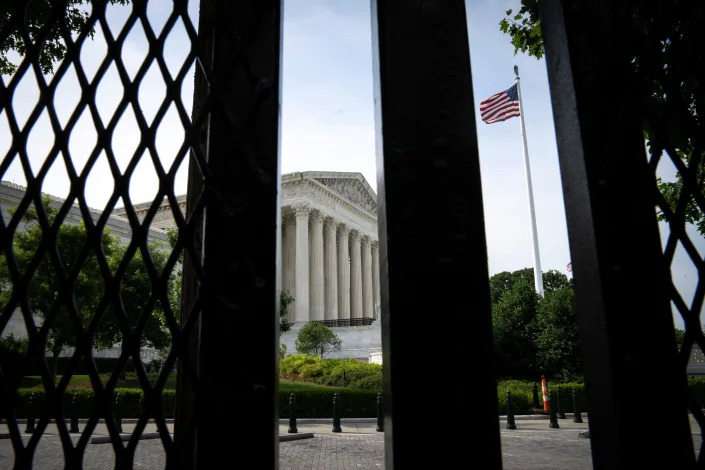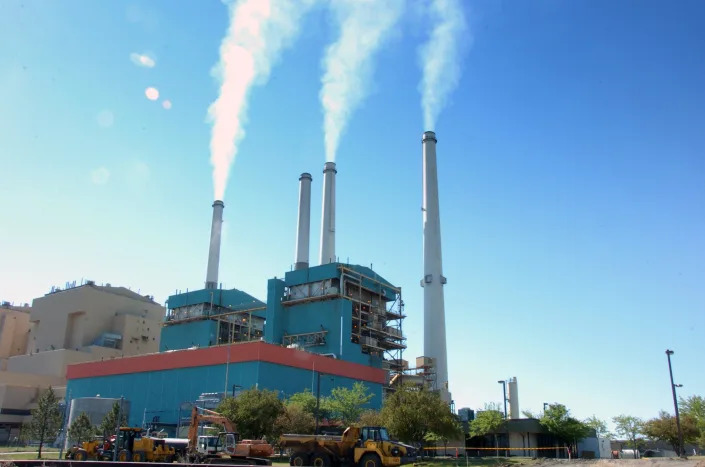#ABOLISHSCOTUS
How the Supreme Court's major climate case could change the course of Biden's presidency
WASHINGTON – Fifteen years ago, a divided Supreme Court ruled the federal government had the power to regulate carbon dioxide from car emissions – a decision hailed by environmentalists as a landmark win in the effort to curb climate change.
But as the high court prepares to decide another major climate case in the coming days and resolve a controversy over water pollution this fall, the mood among environmental groups is more gloomy – and the sense of foreboding, experts say, is likely justified.
That's not only because the Supreme Court is more conservative than it has been in decades – and perhaps more willing to reconsider precedent – but also because environmental rules are caught up in a broader fight over whether federal agencies may regulate businesses without explicit approval from Congress.
The answer to that question will have sweeping implications for President Joe Biden's administration beyond the Environmental Protection Agency if Republicans capture control of Congress this year. Presidents of both parties often turn to agency regulations when they’re unable to move their agenda through Congress – even though those policies frequently run into trouble in court.
"Environmentalists are holding their breath to see just how bad it will be," said Robert Percival, director of the environmental law program at the University of Maryland. "It seems likely that they're going to be making major cutbacks in the EPA's authority."
Power plant emissions
In one of the most significant climate cases to reach the high court in years, the justices will soon decide whether the EPA may regulate carbon emissions from power plants. Nineteen states, led by West Virginia, challenged climate regulations approved by the Obama administration and later abandoned by President Donald Trump.
The decision will land as scientists and international groups issue dire warnings about the Earth's changing climate. A United Nations report in April found that without significant and immediate emission reductions, limiting global warming to 1.5 degrees Celsius – a threshold that risks more severe effects – would be "beyond reach."

The debate over how much leeway federal agencies have to regulate isn’t limited to the environment. Recent Supreme Court decisions striking down a nationwide eviction moratorium – a policy crafted in response to the COVID-19 pandemic – and blocking a mandate that employers create vaccine-or-testing programs raised the same issues.
In the eviction case, the Trump and Biden administrations relied on a 1944 public health law that lets officials "make and enforce such regulations" as they deem "necessary to prevent the…spread of communicable diseases." But the law, the court said, doesn’t say anything specifically about halting evictions during a pandemic.
"It strains credulity to believe" Congress meant to give the Centers for Disease Control and Prevention "the sweeping authority" it used to impose the moratorium, a majority of the court ruled in August. "We expect Congress to speak clearly when authorizing an agency to exercise powers of 'vast economic and political significance.'"
President Barack Obama's EPA required states to reduce emissions by shifting power plants away from coal. The Supreme Court blocked enforcement of those rules in 2016 and Trump repealed them a year later, prompting a new round of lawsuits. While the court’s three liberal justices signaled support for the EPA during oral arguments in February, the court’s six-member conservative bloc was harder to read.
One of the issues the justices debated then was the "major questions doctrine," the principle that Congress can delegate some decisions to agencies but not those that involve "vast" economic or political matters. One sticky issue with that doctrine is that there’s no clear definition of "vast significance." Those who oppose the doctrine say that if a law is vague then Congress intended to give agencies wide deference to interpret it.
Another case the high court will take up later this year deals with the 1972 Clean Water Act which requires Americans to obtain a permit before putting certain pollutants into the "waters of the United States." The law doesn’t define exactly what that term means.
In 2007, a couple began building a home near Idaho's Priest Lake, but the EPA asserted their lot contained wetlands subject to federal regulation.
The couple told the court last year that the agency's interpretation was "emblematic of all that has gone wrong with the implementation of the Clean Water Act." Their lot, they said, doesn't include a stream, river, or lake – the kind of navigable waterways usually covered by the federal requirements.
But the Biden administration countered in court filings that EPA's designation was made eight years before the family bought the property and that the couple dumped nearly 2,000 cubic yards of gravel and sand to fill the wetlands anyway. The wetlands are adjacent to water that eventually feeds into Priest Lake, the government concluded.
'Pushing the boundaries of their powers'
Legal experts point to several factors they say explain why complicated questions about agency power pop up so often in environmental cases. Some of it has to do with how the legal system works broadly as it weighs the impact of laws and regulations.
One of the challenges environmentalists face in federal court is demonstrating the cost of not protecting the environment. It's easier for industries to quantify the expense of updating a power plant to reduce emissions, for instance, than it is to tally up the costs that climate change may impose on an entire society.
"Because we all bear the costs of pollution, the benefits of regulation are often spread broadly, while the costs of reducing pollution are concentrated where they belong – on polluters," said Sambhav Sankar, senior vice president of programs at Earthjustice, an environmental law group.
And while there's often an economic incentive for industries to challenge environmental regulations, there's not always a similarly powerful force to support those rules.
"So that means that this is always a target for pro-industry conservatives," Sankar said. "And when these cases show up in court, the court sometimes struggles to appreciate the value of regulation to society as a whole."
Adam White, a senior fellow at the right-leaning American Enterprise Institute, said the agencies themselves also have a role to play. Administrations may decide that getting legislation through Congress is impossible and so turn to regulations instead. Lawmakers may not be compelled to take a difficult vote if they think the administration is going to act on its own. And agencies, sometimes, may just overstep their authority.
"The agencies with a lot of political wind in their sails have a kind of emergency mentality that they need to do as much as they can as fast as they can," said White, who is also the co-director of the Center for the Study of the Administrative State at George Mason University. "They end up pushing the boundaries of their powers."
Another problem with deferring to agencies, White argued, is that their leadership changes every time a new president is sworn into office.
The upside to that, he said, is that presidential elections "have consequences."
"But the downside is that every four or eight years you get a total overhaul in regulatory policy," White said. "At some point, everybody – the courts, the private sector, all of us – we can look at this and say, 'That's no way to run a country.'"
This article originally appeared on USA TODAY: Supreme Court climate case may have big implications for Joe Biden

No comments:
Post a Comment